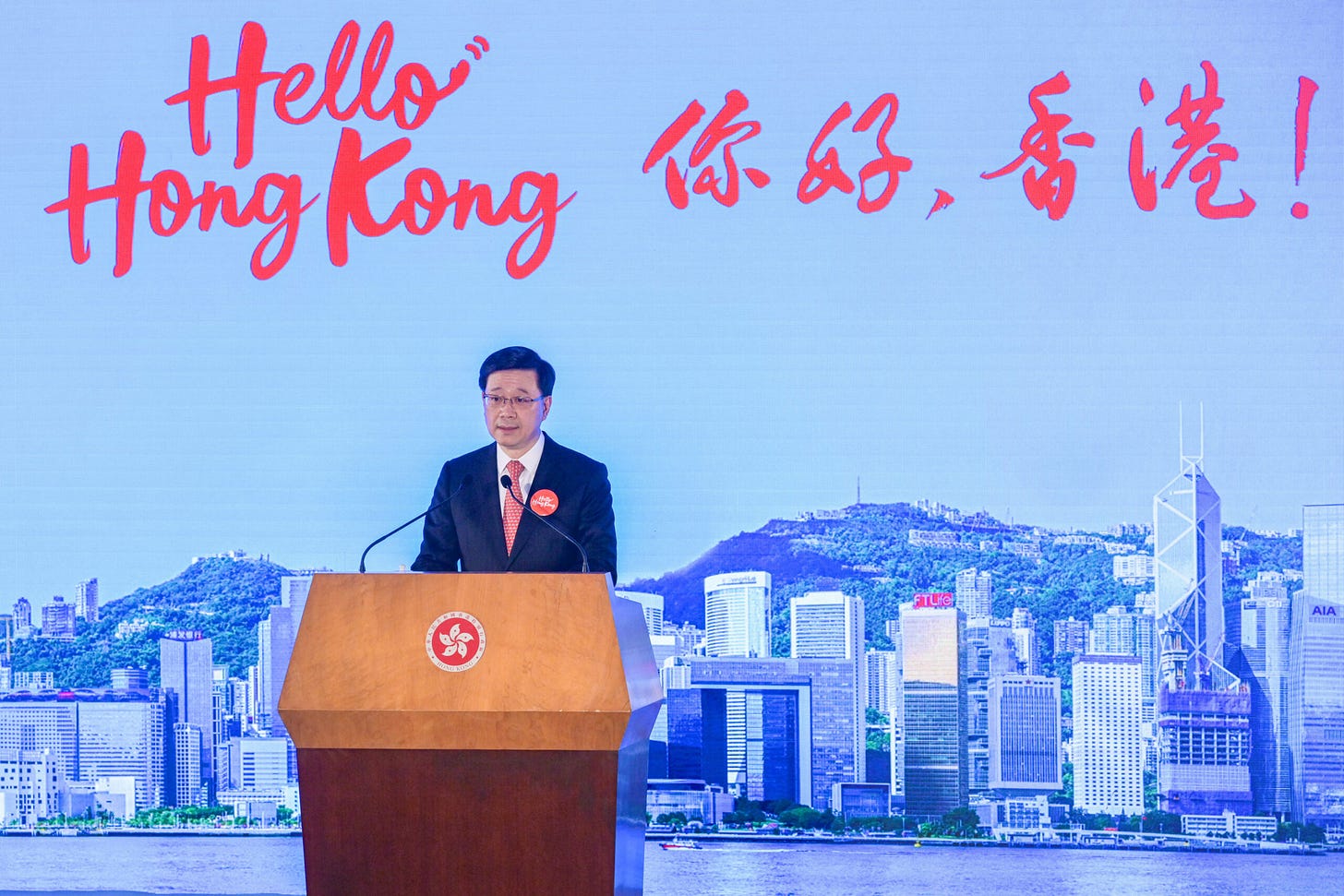Beijing-Controlled Hong Kong Tries, Lamely, to Buff Up Its Image
Never mind the trial of 47 democracy activists now underway. . .

It’s probably not a coincidence that a few days before 47 democracy activists went on trial for subversion on February 6, Hong Kong’s chief executive, a Beijing puppet named John Lee, presided over a ceremony to promote the city’s new marketing campaign. The “Hello Hong Kong” launch featured an opening musical number with dancers dressed as hotel staff, pilots, flight attendants, and chefs, and a giveaway of 500,000 airline tickets.
The Hello Hong Kong campaign is not just an effort to bring back business and tourist travel after the pandemic, or to distract from the trial of the democracy activists. It is also designed—indeed, chiefly designed—to promote China’s narrative about Hong Kong. It is meant to promote the illusion of a Hong Kong contentedly integrating with China, even though in reality Beijing is crushing Hong Kong’s democracy movement, hobbling the rule of law, and snuffing out independent media. The campaign also serves a larger agenda for Beijing by drawing an equivalence between democracy and authoritarianism and coopting leading international business figures in the bargain.
The 47 Hong Kong democrats on trial face possible life sentences under the National Security Law for organizing an informal, public primary to choose the best slate of pro-democracy candidates to contest legislative elections that were scheduled for fall 2020. Several hundred thousand people lined up on a sunny day to participate. A few weeks afterward, those polls were canceled. When “elections” were held at last more than a year later, no democrats contested them—since most were in jail or exiled, and the others couldn’t satisfy Beijing’s definition of “patriotism” that makes loyalty to the party a litmus test and democratic principles subversive.
The National Security Law (NSL), imposed by Beijing on Hong Kong in the summer of 2020, effectively extended Beijing’s direct rule, ending once and for all the city’s promised autonomy and injecting the Chinese Communist Party’s political norms. The NSL outlines a raft of powers for use against democrats and the media and criminalizes just about any behavior the CCP likes. Hong Kong’s once revered legal system now has designated and vetted national security judges.
The NSL’s warrantless searches and asset freezes were used to shut down Apple Daily, an immensely popular newspaper, without due process of law. Apple Daily’s founder, Jimmy Lai, now in his mid-seventies, has already served a jail sentence for commemorating the victims of Tiananmen Square. He is now serving nearly six years on a bogus fraud charge and his prosecution for “foreign collusion,” which carries a possible life sentence, has been delayed until next September.
Beijing’s goals in Hong Kong actually extend well beyond the city. The NSL purports to apply extraterritorially. China harasses and intimidates its citizens who express pro-democracy sympathies overseas. And China operates a sprawling malign influence agenda, in which it seeks to coopt influential figures to advance its goals to amass wealth and technology and to undermine democracy and U.S. leadership on its behalf.
In his presentation, John Lee said Hello Hong Kong will seek out “prominent guests, from business heavyweights and political dignitaries to media chiefs and influencers” to show them the “unparalleled strengths of the city under ‘One Country, Two Systems,’” which is now “seamlessly connected to the mainland.” Hong Kong’s own businesspeople and professionals will set out “to tell their global counterparts the great and true stories of Hong Kong.”
Some prominent figures in American business have already indicated a willingness suppress any misgivings they might have about being used for propaganda purposes. At conference hosted by the Hong Kong government for “global financial leaders” last November, top officials of American investment banks—Goldman Sachs, JPMorgan Chase, BlackRock, and Morgan Stanley—did not object to John Lee’s nonsensical assertions that “under ‘One Country, Two Systems,’ the rule of law is sacrosanct in Hong Kong” and that the city’s “judiciary exercises its power independently.”
Top Beijing officials and their Hong Kong proxies scoff at the impact of travel and financial sanctions imposed by the United States. (Beijing’s top man in the city mockingly offered to send $100 to the United States so there would be something to freeze.) The Biden administration needs to impose other consequences and link them to concrete demands—like the release of political prisoners. It also needs to turn attention to countering Beijing’s narrative about Hong Kong, and China’s broader, insidious agenda of equivalence between democracy and authoritarianism; this should be a major focus of the next Summit for Democracy the Biden administration is hosting in March.
And the administration can stop letting China’s diplomats in the United States travel widely and freely to promote their influence activities and convey its propaganda about the U.S. and democracy, Taiwan, and other issues to American citizens, students, and state and local audiences. The United States has already concluded that Hong Kong is no longer sufficiently autonomous from China to be treated separately from the mainland in U.S. law. So the Hong Kong Economic and Trade Offices should not be permitted to keep promoting tourism, trade, and cultural programming, including Hello Hong Kong, and otherwise liaising with the White House and Congress.
The large show trial of Hong Kong democrats ought to give pause to tourists and businesspeople considering taking up the Hong Kong government on its Hello Hong Kong ticket giveaway. The program is designed to help normalize Beijing’s repression and coopt foreign elites. But for those who do go, here’s an idea: The trial of the 47 democrats is scheduled to last for three months. And there are sure to be more trials after that. Why not go say “hello” to Hong Kong’s political prisoners?



